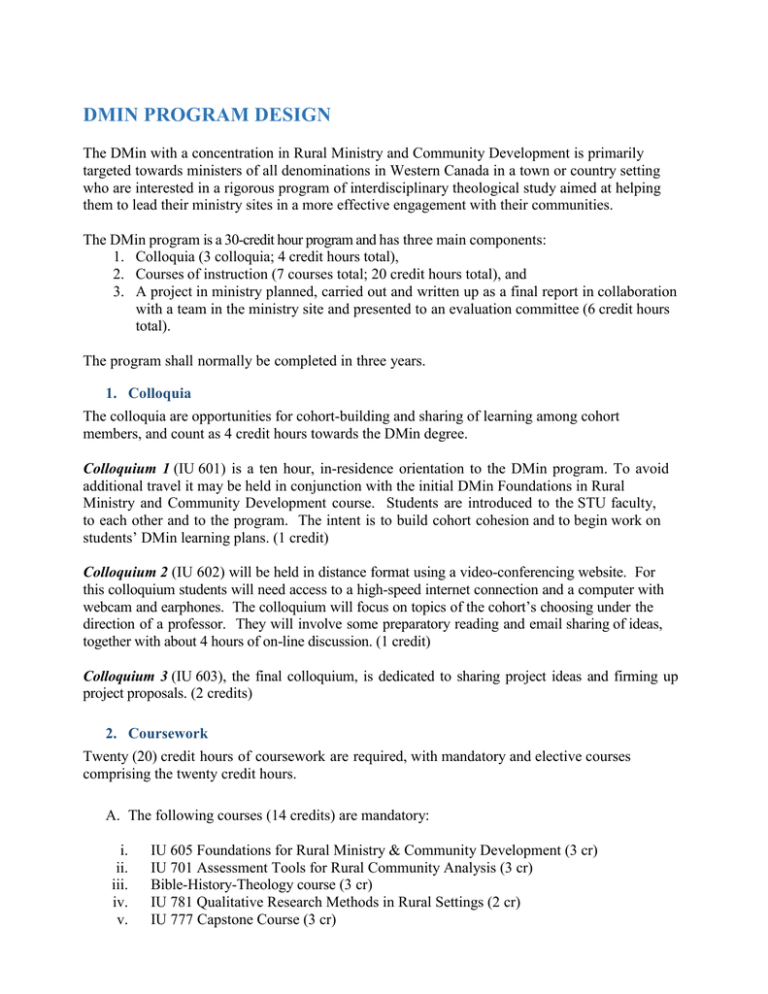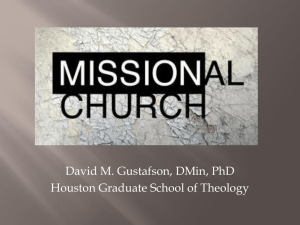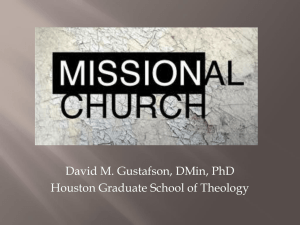Document 12040732
advertisement

DMIN PROGRAM DESIGN The DMin with a concentration in Rural Ministry and Community Development is primarily targeted towards ministers of all denominations in Western Canada in a town or country setting who are interested in a rigorous program of interdisciplinary theological study aimed at helping them to lead their ministry sites in a more effective engagement with their communities. The DMin program is a 30-credit hour program and has three main components: 1. Colloquia (3 colloquia; 4 credit hours total), 2. Courses of instruction (7 courses total; 20 credit hours total), and 3. A project in ministry planned, carried out and written up as a final report in collaboration with a team in the ministry site and presented to an evaluation committee (6 credit hours total). The program shall normally be completed in three years. 1. Colloquia The colloquia are opportunities for cohort-building and sharing of learning among cohort members, and count as 4 credit hours towards the DMin degree. Colloquium 1 (IU 601) is a ten hour, in-residence orientation to the DMin program. To avoid additional travel it may be held in conjunction with the initial DMin Foundations in Rural Ministry and Community Development course. Students are introduced to the STU faculty, to each other and to the program. The intent is to build cohort cohesion and to begin work on students’ DMin learning plans. (1 credit) Colloquium 2 (IU 602) will be held in distance format using a video-conferencing website. For this colloquium students will need access to a high-speed internet connection and a computer with webcam and earphones. The colloquium will focus on topics of the cohort’s choosing under the direction of a professor. They will involve some preparatory reading and email sharing of ideas, together with about 4 hours of on-line discussion. (1 credit) Colloquium 3 (IU 603), the final colloquium, is dedicated to sharing project ideas and firming up project proposals. (2 credits) 2. Coursework Twenty (20) credit hours of coursework are required, with mandatory and elective courses comprising the twenty credit hours. A. The following courses (14 credits) are mandatory: i. ii. iii. iv. v. IU 605 Foundations for Rural Ministry & Community Development (3 cr) IU 701 Assessment Tools for Rural Community Analysis (3 cr) Bible-History-Theology course (3 cr) IU 781 Qualitative Research Methods in Rural Settings (2 cr) IU 777 Capstone Course (3 cr) B. Two (2) electives (6 credits) i. Each student will choose electives from among courses offered at the DMin level and appropriate to his or her learning plan. With approval by the student’s Program Director, the student may transfer in as electives up to six credit hours from appropriate graduate courses in other accredited institutions. The courses will be 5-day intensives, taught by STU and qualified outside faculty from the University of Saskatchewan and other schools. 3. Project in Ministry (IU 789 Project in Ministry) The Project, Final Report and Public Presentation of the Final Report count as 6 credit hours toward the DMin degree. Prior to requesting admission, and throughout the first half of the DMin program, students work with their ministry sites (including community members) to identify an area in which a collaborative community-building project might be carried out. This project will be led by a ministry team, chaired by the DMin student, who is responsible for the initial recruitment and training of the team.




